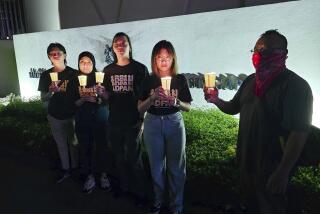UPDATE / ASIA DRUG WAR : American on Trial: Can U.S. Urge Mercy?
- Share via
KUALA LUMPUR, Malaysia — When he was arrested last November, Kerry L. Wiley of Sacramento was accused by Malaysian authorities of having 477.5 grams of marijuana in his room in a Kuala Lumpur suburb.
This was a little more than a pound, and in the United States, Wiley would face at worst a misdemeanor charge of possession. But this is Malaysia, and when Wiley goes on trial next month he will face a charge of drug trafficking, which on conviction means a mandatory death sentence.
Wiley, 37, a former employee of IBM, came to Malaysia as a tourist and is the first American to face the death penalty for a narcotics violation in Malaysia. His case is attracting unusual attention because it comes at a time when the Bush Administration has proposed the death penalty as a means of slowing the drug traffic.
Malaysia has used the death penalty in drug cases since 1975, when the government decided that judges were being too lenient in ordering capital punishment in drug cases. But opinion is sharply divided as to whether it has slowed the drug traffic.
“Given the rate of increase in drug trafficking cases, it’s clear that the death penalty is not working,” Karpal Singh, a leading defense attorney and opposition politician, said.
Malaysia has hanged 93 men and women for drug trafficking since 1975, and 191 others are on death row with appeals pending. An accused person can be charged with trafficking for selling any amount of drugs.
Wiley’s lawyer, Muhammad Shafee Abdullah, said there is a “mass of medical evidence” that Wiley has used marijuana as a pain reliever for years since being injured in an accident, but that the burden will be on him to prove it. And even if he escapes the death penalty, he faces life imprisonment on a lesser charge of possession.
The Wiley case is something of an embarrassment for Washington, for, as one Western diplomat put it, “the Americans can hardly call for tough treatment of drug traffickers on the one hand and appeal for mercy for Wiley on the other.”
A spokesman at the U.S. Embassy would say only that “the Malaysian government is aware of this case, the U.S. government is aware of this case, and we don’t comment on our relations.”
Zainuddin A. Bahari, director of Malaysia’s Anti-Drug Task Force, said the death penalty has achieved the goal of forcing foreign drug traffickers to use other countries as a transit point.
Still, the argument for capital punishment is a tenuous one. According to a U.S. narcotics control strategy report, Malaysia increased opium seizures by 275% last year compared with 1988, from about 510 pounds to about 1,400 pounds.
“The drug laws are clearly not working,” attorney Muhammad Shafee said. “The increased drug seizures could be a sign of increased police efficiency, but they are also a sign that there is a lot more trafficking taking place.”
Total arrests in drug cases have risen from 10,068 in 1986 to 11,614 last year. Perhaps more important, a study by the National Drug Research Center at the University of Malaysia estimated that the rate of drug-dependent persons per 100,000 population increased from 84.3 in 1976 to 754.6 in 1986.
“There doesn’t seem to be any decrease in drug use,” said Param Cumarasamy, head of the human rights section of the Malaysia Bar Assn. “The question is whether the law has been a deterrent. If it’s not working as a deterrent, I don’t think they should be meting out these sentences and taking away lives.”
More to Read
Sign up for Essential California
The most important California stories and recommendations in your inbox every morning.
You may occasionally receive promotional content from the Los Angeles Times.













